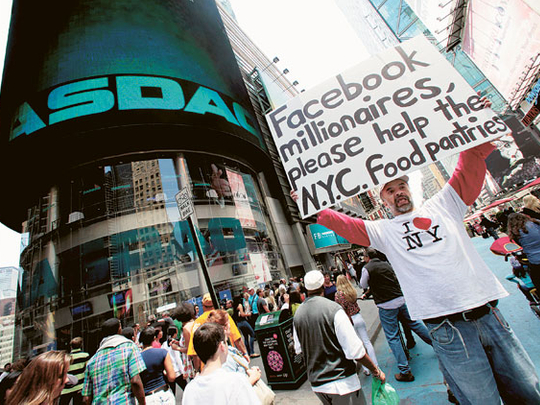
Los Angeles: There wasn't much to like about Facebook's first day as a public company.
The social media giant's stock rose by mere pennies in its initial public offering. The shares closed at $38.23, barely above the $38 IPO price. The performance fell far short of the grandiose expectations of Wall Street and Silicon Valley, and raised questions about whether the company's stock will be the sure bet many had counted on.
"There was all this pressure and hype and attention with all eyes on Face-book — and the starlet tripped on the red carpet," said Max Wolff, an analyst at GreenCrest Capital Management in New York.
What went wrong? Analysts point to a variety of factors that might have given investors pause. Its valuation at about 100 times earnings likely struck some as too high. Its growth in new users is slowing. And Facebook has not yet found a way to cash in on mobile devices, where social media is gravitating.
Advertising blow
Last week's decision by General Motors to stop advertising on Facebook because it wasn't getting results raised concerns about how Facebook can profit from its 900 million users.
But perhaps the biggest blunders came in recent days as the company and its largest shareholders moved to maximise their profits at the expense of new investors. Last Monday, Facebook raised the stock's projected price to a range of $34 to $38 from the initial $28 to $35, and priced it at the peak of $38 on Thursday. That made Facebook far more expensive than established competitors such as Apple and Google based on the companies' earnings.
On Wednesday, the company announced that longtime investors led by Goldman Sachs planned to sell big chunks of their holdings in the IPO. That struck some investors as greedy and a sign that Wall Street insiders were getting out while they could.
"There was a lot of smart money dumping it," said Barry Ritholtz, chief executive of research firm Fusion IQ. That added to fears among professionals and individuals who were burned by the late-1990s dot-com boom and subsequent stock-market crash.
Facebook also was a victim of heightened expectations stirred by its own success.
The IPO raised $16 billion, making it the third-largest in US history. It valued the entire company at $104 billion, the largest ever for a newly public company.
Sectoral setback
But Facebook failed to notch the sizable first-day gains that had become de rigueur for scores of previous big-name companies. Google jumped 18 per cent on its first day in 2004 and professional networking company LinkedIn surged 49 per cent a year ago.
Facebook's disappointing entrance sent a tremor through the broader technology industry, which had hoped to capitalise on the excitement generated by the public fascination with social media.
Other social media stocks got walloped, with daily deals site Groupon slipping 7 per cent and Zynga falling 13 per cent.
Just 15 minutes after the stock began trading, brokerages complained that they weren't getting confirmation that trades were going through. Nasdaq warned that there were glitches in executing trades. Some agitated investors waited more than two hours to learn if their orders went through.
The problems caught the attention of the Securities and Exchange Commission, which said it would launch an investigation of the technical problems to prevent future snafus. The exchange also said it was looking into the matter.
"At its current valuation it's trading approximately 100 times earnings, which is certainly a very rich valuation," said Michael A. Yoshikami, CEO of Destination Wealth Management. "It will be interesting to see what happens in the future for social media companies, particularly considering Zynga's drop today in response to the Facebook offering. In particular, advertising, which has been slowly decelerating in terms of growth, will likely be under pressure in the future, particularly considering General Motors' recent decision to cease advertising on Facebook."
— Los Angeles Times












